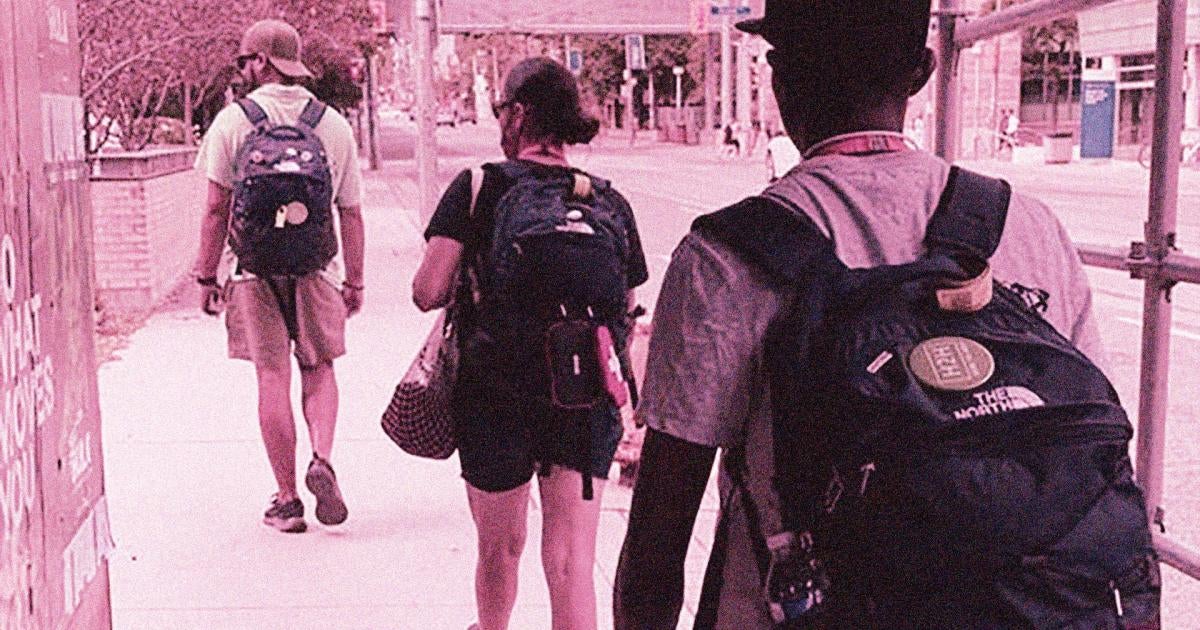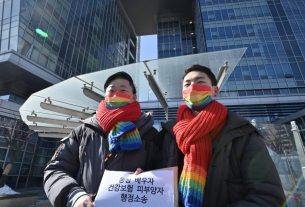(Toronto) – Governments should invest in mental health care services that help people in humane and rights-respecting ways, Human Rights Watch and Gerstein Crisis Centre said today, releasing a model for community-based mental health crisis response. The case study can serve as a roadmap to support people experiencing a mental health crisis without resorting to policing, involuntary hospitalization, and forced treatment.
Systemic inequities, coercive practices, and police violence remain globally pervasive problems that put people experiencing a mental health crisis at particular risk. This is especially true for Indigenous, Black and racialized groups, and Two-Spirit, lesbian, gay, bisexual, transgender, queer+ (2SLGBTQ+) people. The common practice in many countries of sending police as first responders, including for “wellness checks,” increases the risk of injury or death. Even nonpolice responses to people in crisis can excessively pathologize people and lead them into coercive or forced treatment.
“In many communities, people who experience a mental health crisis are confronted with police or coerced into treatment against their will, and there’s another way,” said Samer Muscati, associate disability rights director at Human Rights Watch. “Governments should invest in effective responses that are based on a person’s right to direct the type of support they receive and decide what’s best for them.”
To demonstrate an effective, alternative approach, Human Rights Watch partnered with Gerstein Crisis Centre, a community-based mental health crisis response center in Toronto that provides services that are consent-based, nonmedical, trauma-informed, and focused on harm reduction. The 33-page case study, “Mental Health Crisis Support Rooted in Community and Human Rights,” presents a viable, replicable framework for a holistic approach to mental health crisis response that supports the autonomy of the individual in crisis.
The case study lays out a rights-respecting and community-based alternative to over-medicalized and police-led responses. It provides a detailed description of the Centre’s approaches and includes lessons learned and good practices from decades of mental health support.
“Over three decades of community-based support for people experiencing mental health crisis has proven the effectiveness and importance of accessible and noncoercive pathways to address the health and wellbeing of our communities,” said Susan Davis, executive director of Gerstein Crisis Centre. “There is more to do to improve our health and social systems and that includes investments and coordinated mental health and addiction strategies at all levels of government.”
The case study offers an example of what has worked well in Canada’s largest city with the principles of autonomy, dignity, and non-policing applicable to communities and countries around the world.
Since 1989, Gerstein Crisis Centre has offered communities in Toronto safe, humane, equity-based crisis services. This framework includes free and confidential 24/7 tailored support services to individuals experiencing a mental health or substance use crisis, including thoughts of suicide, all of which may be exacerbated by or emanate from trauma, housing insecurity, and poverty, among other factors. The aim is to provide individuals experiencing mental health crisis timely support, connect them with other services they need, and divert them from unnecessary interactions with police and hospital emergency rooms.
The case study documents the lived experience of Kaola Baird, a woman who received support at the Gerstein Crisis Centre and continues to work as a peer to support others experiencing mental health crisis.
“I think when you’re going through a crisis … sometimes you lose a sense of who you are,” she said. “And I think there’s a lot to be said for not wanting to be seen as your crisis because there’s still a person underneath. And by going through it myself, I think it just gives you that deeper understanding … I have a lot of empathy … I try to give back what I received and still do receive. You just go full circle, but for me, I always think the circle gets larger.”
The Centre employs about 100 people, the majority of whom have lived or living experience with mental health conditions or substance use.
Gerstein Crisis Centre runs a 24/7 telephone crisis line available to community members. The Centre also operates a mobile crisis team that follows up on calls in the community upon the caller’s request. Crisis workers dress in regular clothes to ensure privacy and to reduce stigma and power imbalances that uniformed or logoed apparel might evoke.
The Centre hosts crisis beds in private rooms in two houses that provide a safe and supportive environment, staffed around the clock, designed for short-term stays of up to 30 days. The Centre’s team provides short-term follow-up support, including referrals to other health and social services, as well as recovery programs led by individuals with experience of mental health, substance use, and the criminal legal system.
The case study incorporates guidelines from the World Health Organization (WHO), including details about informed consent in mental health crisis response, treatment and recovery plans led by the person in crisis and focusing on their strengths, as well as understanding power relations and strategies to avoid and defuse conflict.
According to the WHO in 2019, an estimated one in eight people globally – 970 million people – was living with a mental health condition and yet, on average, only two percent of national health budgets were dedicated to mental health.
Mental health services frequently fail to comply with international human rights standards due to stigma, the use of coercion, and power imbalances between the service provider and the person seeking or receiving support. In many jurisdictions, inadequate legal and policy protections reinforce discrimination and abusive treatment of people with mental health conditions. The situation is particularly dire for individuals experiencing mental health crises, including in circumstances related to substance use, suicidal thoughts, trauma, housing insecurity, and poverty. It is especially so for Indigenous, Black, racialized, and 2SLGBTQ+ communities, who continue to experience inequitable access to health care and are overrepresented in judicial systems.
According to Human Rights Watch and Gerstein Crisis Centre, mental health service provision can – and should – respect the human rights of people seeking or receiving care. The necessary components of mental health services that respect human rights include informed consent, respect for individuals’ wishes and perspectives, as well as the availability, accessibility, acceptability, and quality of mental health services. Human Rights Watch and Gerstein Crisis Centre urge governments to examine this case study to design and fund their own programs to provide community-based and rights-respecting support to people experiencing mental health crises.
The case study is part of an initiative by Human Rights Watch to promote solutions-oriented approaches as a way to encourage governments and community-based organizations to develop policies and practices that respect human rights and comply with the principles in the UN Convention on the Rights of Persons with Disabilities (CRPD). As the first part of this series, Human Rights Watch documented the innovative approach of TANDEMplus, a mobile team in Brussels providing mental health services to people with psychosocial disabilities in their homes or a place of their choice, where they work hand-in-hand to find solutions and help the person regain control over their everyday life.
“Police responders and coercive treatment have been the priority response for people experiencing mental health crises,” said Muscati. “Governments should make a paradigm shift and take a new rights-respecting approach that centers the dignity, expertise, and autonomy of people living with mental health conditions.”



